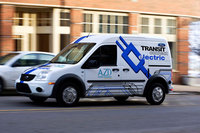Can Chicago Go Electric? Ford Taps Experts to Examine Opportunities, Challenges of Electric Cars
SEE ALSO: Electric Vehicles - Solution or Diversion?
CHICAGO, Oct.
29, 2010; Ford Motor Company brings together local experts to discuss Chicago's electric vehicle future. Experts from Ford, ComEd and the
Chicago Department of Environment examine what the Windy City is doing to
prepare for electric vehicles including infrastructure development and grid
readiness Over the next two years, Ford will
introduce the Transit Connect Electric small commercial van (late 2010),
Focus Electric passenger car (2011), two third-generation lithium-ion
battery hybrids (2012) and a plug-in hybrid (2012)
Ford is working with utilities across the
country to educate consumers about what to expect from electrified
automobiles and what is needed from the public and private sector to
support this new technology. Chicago and
Detroit are the only Midwest stops on the
"Charging Into the Future" Ford Electric Vehicle Tour Ford Motor Company today convened key experts from the city of Chicago and ComEd to examine critical issues
related to consumer adoption of electric vehicles. Ford has been working to engage utilities, city
and state governments and infrastructure providers in efforts to promote
the commercialization of electrified vehicles to reduce CO2 emissions and
increase energy security. "Ford has an aggressive plan to bring
five new electrified vehicles to market over the next two years including
the Transit Connect Electric later this year and the Ford Focus Electric in
2011," said Sherif Marakby, director of Electrification Program and
Engineering, Ford Motor Company. "There is incredible excitement for
electric vehicles in the Chicago area. To
support the rollout and acceptance of these vehicles in Chicago and across the country, it is critical
to work with local utilities and cities to make sure the necessary electric
infrastructure and grid is ready for both vehicles and consumers." Ford plans to work with utilities as
well as state and local officials to address issues related to the
permitting and regulations that can support electric vehicle
infrastructure. An easy charging station permitting process is considered
an important element for electric vehicle acceptance in the Chicago area, Illinois and across the country. "Electric vehicles will be a key new technology in helping to reach the
goals of the Chicago Climate Action Plan," said Suzanne Malec-McKenna, commissioner of the Chicago
Department of Environment. "We are excited about bringing electric vehicles
to Chicago so that residents and
businesses can take full advantage of the benefits these vehicles
offer." The "Charging Into the Future – Ford Electric Vehicle
Tour," which kicked off at Portland State
University in Portland, Ore., last
month, is visiting 14 key cities to promote Ford's electric vehicle strategy as well as
educate consumers about what to expect from electrified automobiles and
what is needed from the public and private sector to support this new
technology. Chicago and Detroit were the only two Midwest cities
included in the tour. Over the next two years, Ford will
introduce the Transit Connect Electric small commercial van (2010), Focus
Electric passenger car (2011), two third-generation lithium-ion battery
hybrids (2012) and a plug-in hybrid (2012). These vehicles will achieve
breakthrough efficiency; some, like the pure battery electric Transit
Connect Electric and Focus Electric, will use no gasoline at all. Electrification is an important piece of Ford's overall product sustainability strategy
that features a range of fuel-efficient and alternative-fuel technologies
including EcoBoost™ engines, six-speed transmissions, electric
power-assisted steering, aerodynamic improvements and light-weighting
materials. Ford's electrification strategy
also leverages the most fuel-efficient powertrains, the most technically
competent hybrids and global vehicle platforms in order to develop
affordable, fuel-efficient choices for consumers.
About Ford Motor Company
Ford Motor Company, a global automotive industry leader based in
Dearborn, Mich., manufactures or
distributes automobiles across six continents. With about 163,000 employees
and about 70 plants worldwide, the company's automotive brands include
Ford, Lincoln and Mercury, production of which has
been announced by the company to be ending in the fourth quarter of 2010.
The company provides financial services through Ford Motor Credit Company.



